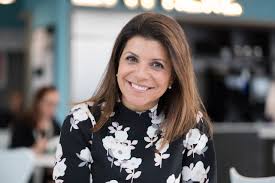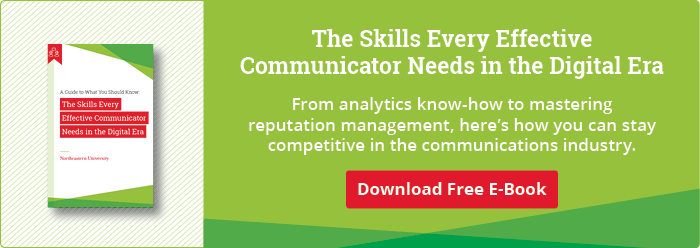Editor’s note: This post originally appeared on the Communications Alumni Network Blog.
Today’s communication professional is tasked with many challenges, not the least of which is developing and maintaining a competitive skill set. 
As Egon Zehnder’s global head of the human resources and communication practice, Gizem Weggemans knows this to be true. In her interview with Carl Zangerl, faculty director for Northeastern’s MS in Corporate and Organizational Communication program, she discusses what it takes to be a well-rounded communication leader in today’s market.
Carl Zangerl (CZ): Tell us a little bit about Egon Zehnder.
Gizem Weggemans (GW): Egon Zehnder is one of the world’s leading leadership advisory and executive search firms. We spend our time working with boards and executive committees in helping solve for their talent issues, but at a much broader level. Much like management consultants do in other parts of the business, we try to solve for business issues where talent comes into play. So we do search work, leadership development, and organizational design. So, anything that has human capital at the heart of it, that’s what we do.
CZ: I recall well your article about the changing role of the Chief Communication Officer (CCO) and how [the role] was calling for a new set of competencies and experiences. I think the role was defined more conventionally when I headed up the communication function for a large corporation. When you’re talking to Chief Executive Officers (CEOs) about what their expectations are for the top communication adviser in their organization, what are they telling you?
GW: I think what’s become very, very clear to them is that the CCO has to know how to engage with a wide range of stakeholders and proactively think about what could derail the organization’s reputation. So the whole notion of being simply a spokesperson for the organization is very much passé.
Download Our Free Guide on the Skills Every Communicator Needs in the Digital Era
From analytics know-how to reputation management, here’s how you can stay competitive.
When we talk to the more evolved CEOs, what they’re looking for is a trusted adviser as their CCO. That’s why we spend a lot of time talking to communication leaders about personal development and becoming a business person who happens to have communication as their functional focus. As the organization’s CCO, you want to be the person the CEO can look in the eyes when there’s nobody else in the room to ask the question “What do I do?” And you’re able to give an answer the CEO is able to trust.
You also need to be ‘macro’ enough to think about all of the stakeholders, but also be such an intuitive person that you’re actually advising the top team on things that are really personal—which is less a technical skill and more a human skill.
CZ: Is it tough to find people who have that mix of competencies?
GW: It is very tough, and the pool of top-notch CCO candidates is very small. Human resources and communication have not always been the functions that organizations have invested in because they were seen as technical functions, as delivery functions, rather than business functions. What we’ve come to realize is that those two functions have human capital at their center—we can’t ignore them. So our focus is helping to develop that next generation of communication and human resource leaders in order to increase the pool of qualified candidates.
CZ: That makes so much sense, which leads me to my next question. Not all of us in the communications field are going to be CCOs, but we can all aspire to be trusted advisers within our organizations. For folks who are early in their careers, what is your advice? What skills should they be focusing on?
GW: I think the fundamental advice is to be curious. At Egon Zehnder, we spend a lot of time assessing people, and the number one indicator of high career potential is curiosity. I would encourage everyone to be curious about the world, about their business, and about themselves. Ask for feedback and venture into different offices, different meetings, different businesses so that you can get exposed to all parts of the conversation as opposed to just one part of the conversation.
The number one indicator of high career potential is curiosity.—Gizem Weggemans, head of @EgonZehnder's global HR and Communication practice Click To Tweet
Second, from a technical skills perspective, the earlier people can get exposed to integrated communications, the better. Traditionally, we have had silos within the communication function. Try to branch out as early as possible because, frankly, we don’t see specialized roles as being the route to the top.
And finally, make a genuine investment in yourself. Specialized communication skills are almost considered a given by employers, they’re not what is going to differentiate you. What will? The ability to think strategically, to go after results, and to engage with others in a meaningful way.
CZ: Gizem, thanks so much for sharing your perspective on the changing role of the communication leader. The notion of curiosity resonates with me, as does the discipline of looking at the communication function in a strategic way. We encourage our students to focus on outcomes, not simply activities. And we ask them to reflect on what they’ve learned and to continue learning long after they graduate. That curiosity factor!
How has curiosity played a role in your career growth? For more communication-related career advice and trends, visit Northeastern’s Communications Alumni Network blog.






Related Articles
Why Earn a Professional Doctoral Degree?
5 Tips to Get the Most out of Grad School
Is Earning a Graduate Certificate Worth It?